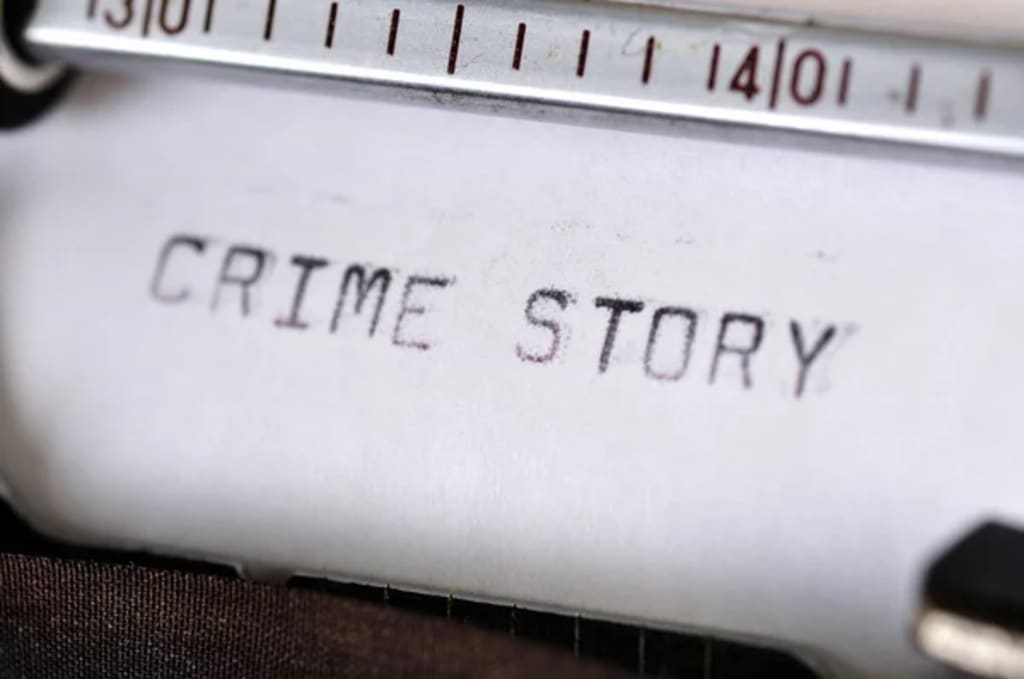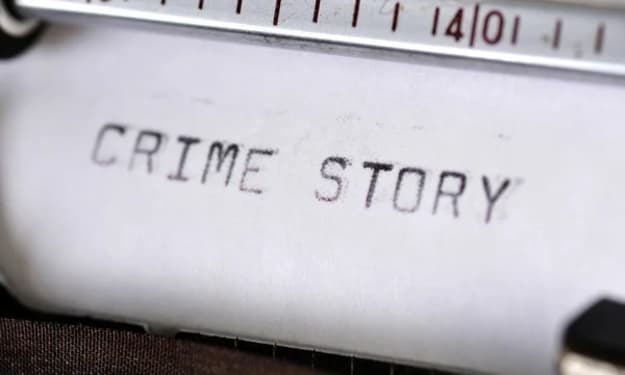Content warning
This story may contain sensitive material or discuss topics that some readers may find distressing. Reader discretion is advised. The views and opinions expressed in this story are those of the author and do not necessarily reflect the official policy or position of Vocal.
"Behind the Badge: Tales of Intrigue and Resilience - A Police Officer's Journey"
"Unveiling the Realities of Law Enforcement and the Struggle for Emotional Resilience"

As a police officer in South Jersey, my journey in law enforcement began when I was 23 years old. I had always been drawn to the idea of making a difference in my community, and the opportunity to serve as an officer allowed me to do just that. However, the reality of the job was quite different from what I had imagined.
In my County, most of the calls I responded to were not as thrilling as the ones portrayed in movies or TV shows. It was a lot of routine work, dealing with disturbance calls, occasional shoplifting incidents, and other minor offenses. Of course, there were more serious cases sprinkled in, but they were not as frequent as one might expect.
Working different shifts exposed me to various situations. The night shift, in particular, had its fair share of strange and eerie encounters. I recall one particular night when I was patrolling a quiet road with no street lights and dense woods on both sides. It was a serene but unnerving environment.
Suddenly, my attention was drawn to a faint reflection of tail lights approaching from the right-hand side of the road, in the grass. As I got closer, I noticed that the driver's side door was open. Instinctively, I veered onto the grass, intending to offer assistance if needed. However, as I slowed down, a figure emerged from the car and bolted into the woods.
Intrigued and concerned, I radioed for backup and described the situation as a suspicious person or vehicle case. With my flashlight and hand on my holster, I approached the car and peered inside. To my surprise, the car seemed empty, but a strong and nauseating odor emanated from within. The smell was like that of a rotting animal, making me uneasy.
Calling out to the woods, I asked if anyone needed assistance. I cautiously ventured closer to the tree line, waving my flashlight around. My training told me to be prepared for the worst, but I had no idea what I was about to encounter. Soon, I heard footsteps rustling in the woods, confirming my suspicion that someone was hiding.
The situation escalated as a deep voice resonated from the darkness. I couldn't make out what the voice was saying, but it didn't sound like someone in pain or distress. Rather, it felt more calculated, like the person was intentionally hiding and evading detection.
I maintained a firm grip on my flashlight and called out again, asking if the individual was injured or needed help. There was no response, and the silence sent chills down my spine. Something didn't add up; why would someone run into the woods upon seeing a police car? My senses were on high alert, and I prepared to unholster my gun.
As I continued my investigation, I discovered that the car had no license plates, adding another layer of intrigue to the situation. Inside the passenger side, I found multiple bloodied tissues and paper towels, completely soaked in blood. The sight was deeply disturbing, and I knew I had to exercise caution and request additional assistance.
I decided to call for backup and report a possible murder. The seriousness of the situation necessitated a thorough search of the woods for any potential evidence or leads. However, despite hours of searching, we found no blood trails or any indication of the person I had seen running into the woods.
Eventually, the canine unit was called in to aid in the search. Despite their best efforts, the search yielded no results, and we were left with more questions than answers. The stolen vehicle was taken into custody, but there were no fingerprints or DNA matches in the database, leaving the identity of the driver and the origin of the severed hand a mystery.
This case would haunt me for a long time. The lack of progress and closure was frustrating, and the eerie nature of the encounter lingered in my thoughts. Even now, I wonder what happened that night and who was responsible for leaving the car with such gruesome evidence.
Apart from this unsettling case, there were other instances that left a lasting impact on my career as a police officer. One such incident involved a peculiar house in a shady area of our County. We received a call from a woman living alone, reporting a possible breaking and entering. She mentioned finding a broken window downstairs but couldn't confirm if anyone was inside. As she went upstairs to bed, she thought she heard footsteps moving around downstairs.
The woman's call abruptly disconnected, and she didn't respond to any callbacks. As I arrived at the house, I knocked on the front door several times, but there was no answer. Concerned for her safety, I decided to inspect the house.
As I walked around the property, I found the broken window she had mentioned. Peering into the dark house, I called out that it was the police, hoping to alert anyone inside of my presence. Still, there was no response. I radioed dispatch to inform them of the situation and decided to enter the house through the broken window.
Stepping over the shattered glass into the kitchen, I proceeded cautiously with my gun drawn. The silence inside the house was eerie, and my heart rate quickened as I searched for any sign of intruders or the woman. After clearing the living room with no sign of anyone, I made my way upstairs, where the woman's bedroom was located.
I called out to her, identifying myself as a police officer. I heard a soft response from upstairs, confirming her presence. Following her voice, I found her sitting up in bed, visibly distressed. She explained that she had hung up the phone to avoid alerting the intruder, and that's why she hadn't answered my callbacks.
The situation seemed tense, and I noticed that she was signaling something to me. It was a silent nod towards the closet and a subtle shake of her head towards the bed. I understood what she was trying to convey: there was someone hiding under the bed.
With my adrenaline pumping, I concocted a plan to apprehend the intruder without alarming them. I asked her to sign a report form, claiming that everything was normal, while gesturing for her to move away from the bed. As she approached, I pushed her out of the room, drew my gun, and loudly ordered the person hiding under the bed to come out.
The ruse worked, and a middle-aged man emerged from under the bed with his hands up. I ordered him to drop any weapons and placed him under arrest. It was a tense and precarious situation, but I was relieved that we managed to apprehend the intruder without any further complications.
Back outside, more officers had arrived, and we secured the area. The woman explained that the intruder had threatened her with a weapon, and she feared for her life. Instead of fleeing, he decided to stay and hide under her bed when he heard the police approaching.
The incident left me shaken but also grateful that I was able to respond in a way that ensured the woman's safety. It was a reminder of the unpredictability of police work and the need to think quickly and creatively in critical situations.
In another disturbing case, my partner and I were assigned to a unit that handled tethers or ankle monitors. One night, we received an alert for a house located between Macon and Roberta. The place had a reputation for being abandoned, and not many people ventured near it.
When we arrived, we found an older gentleman sitting on the steps outside the front door. He was visibly distraught and crying. We approached him with caution, and as we tried to question him,he was completely incoherent and unable to provide any meaningful information. It was evident that he had witnessed something traumatizing, and we immediately called for backup to secure the scene.
With my partner watching the distressed man, I decided to enter the house to investigate further. The stench of decay hit me as soon as I stepped inside. The kitchen and living room were a complete mess, filled with hoarded items stacked haphazardly. The conditions were deplorable, and spoiled food covered the table, attracting swarms of flies.
I cautiously called out, but there was no response. I continued my search, moving down the hall towards the source of the foul odor. As I reached the bedroom, the stench intensified, making it almost unbearable. My heart pounded in my chest, and I braced myself for what I might find.
With my hand over my mouth and nose, I opened the bedroom door. The sight that greeted me was horrifying and sent shivers down my spine. Two gray-skinned corpses lay on the bed, covered in flies. Their faces were starting to decompose, and flies buzzed in and out of their mouths. The gruesome scene was something I had never encountered before, and it would stay with me for years to come.
But what was even more heartbreaking was the discovery of an infant in the arms of the female corpse. The baby had met the same tragic fate as its parents, and it was a sight that haunted my dreams for months. I struggled to comprehend how anyone could allow such a tragedy to unfold.
The investigation that followed revealed a devastating tale of addiction and neglect. The husband and wife had become addicted to opioids following a medical procedure. Their addiction escalated until they turned to heroin, eventually leading to their demise. Their daughter, a mere toddler, had succumbed to neglect, as her parents were consumed by their addiction.
The coroner's report revealed the presence of lethal levels of heroin in both their bodies, indicating that they had taken their own lives. The tragedy was further compounded by the fact that their friend and former coworker, the man we had found outside, had discovered the horrifying scene when he checked on them.
It was a case that deeply affected everyone involved, leaving scars that time could never heal. As a police officer, we are trained to handle traumatic situations, but some incidents are simply too harrowing to ever fully recover from.
In addition to these distressing cases, there was another incident that involved a young woman living alone in a house that had experienced a possible break-in. When I arrived at the scene, there was no response to my repeated attempts to make contact with the occupant. Worried for her safety, I decided to enter the house to check on her.
As I cautiously made my way through the house, I discovered a broken window in the kitchen. I called out, announcing myself as a police officer, but there was still no response. The silence inside the house made me uneasy, and my instincts told me that something was not right.
As I continued my search, I made my way upstairs to the woman's bedroom. When I entered the room, I found her sitting on the bed, visibly distressed. She explained that she had hung up the phone when she thought she heard footsteps downstairs, fearing that the intruder might hear her talking to the police.
Her subtle gestures indicated that someone was hiding under the bed, which immediately put me on high alert. I devised a plan to safely apprehend the intruder without putting the woman at further risk. I asked her to sign a report form, pretending that everything was normal while subtly guiding her away from the bed.
As she moved towards me, I pushed her out of the room and drew my gun, commanding the intruder to come out from under the bed. To my relief, he complied and surrendered without further incident. The situation could have turned out much worse, but we managed to neutralize the threat and ensure the woman's safety.
Despite the challenges and traumatic experiences I faced as a police officer, I still found moments of pride and satisfaction in my job. There were times when I was able to make a positive impact on people's lives, bringing justice to victims and their families. It was these moments that reminded me why I had chosen this career in the first place.
However, the toll of the job also took its toll on me personally. Over time, the stress and trauma I encountered on a daily basis began to affect my mental health. Nightmares of the horrifying scenes I had witnessed haunted my sleep, and I found it increasingly difficult to disconnect from work when I was off-duty.
To cope with the emotional burden, I turned to alcohol, seeking solace in its temporary numbing effects. My drinking gradually escalated, becoming a crutch to help me deal with the pain and memories that refused to fade. It was a dangerous path to tread, and I knew I needed help.
Recognizing that I couldn't overcome these challenges on my own, I sought therapy to address my emotional wounds and develop healthier coping mechanisms. Opening up about my experiences, fears, and vulnerabilities allowed me to process the trauma and gain a new perspective on my role as a police officer.
Therapy also helped me understand the importance of self-care and finding healthy outlets for stress. I began to engage in physical activities like jogging and martial arts, which not only improved my physical health but also helped me manage stress and anxiety.
With the support of my therapist and loved ones, I slowly regained control of my life and developed a healthier approach to my job as a police officer. It was a journey of self-discovery and healing that made me a stronger and more compassionate officer.
Looking back on my career, I am proud of the work I have done and the lives I have touched. But I am also acutely aware of the toll that law enforcement can take on an individual's mental health. The experiences I have shared are just a glimpse into the challenges faced by police officers on a daily basis.
It is crucial for law enforcement agencies to prioritize the well-being of their officers and provide adequate mental health resources and support. The emotional toll of the job can be overwhelming, and officers need a safe space to process their experiences and seek help without fear of judgment or stigma.
As I reflect on my journey as a police officer, I am grateful for the lessons learned and the growth I have experienced. While the job may not always be as exciting as depicted in movies, it is undoubtedly one of the most demanding and impactful professions.
To those considering a career in law enforcement, I would advise them to approach it with a deep understanding of the challenges and a commitment to self-care and emotional well-being. The road ahead may be tough, but with the right support and resilience, it is possible to make a positive difference in the lives of others while also safeguarding one's own mental health.
About the Creator
Enjoyed the story? Support the Creator.
Subscribe for free to receive all their stories in your feed. You could also pledge your support or give them a one-off tip, letting them know you appreciate their work.





Comments
There are no comments for this story
Be the first to respond and start the conversation.